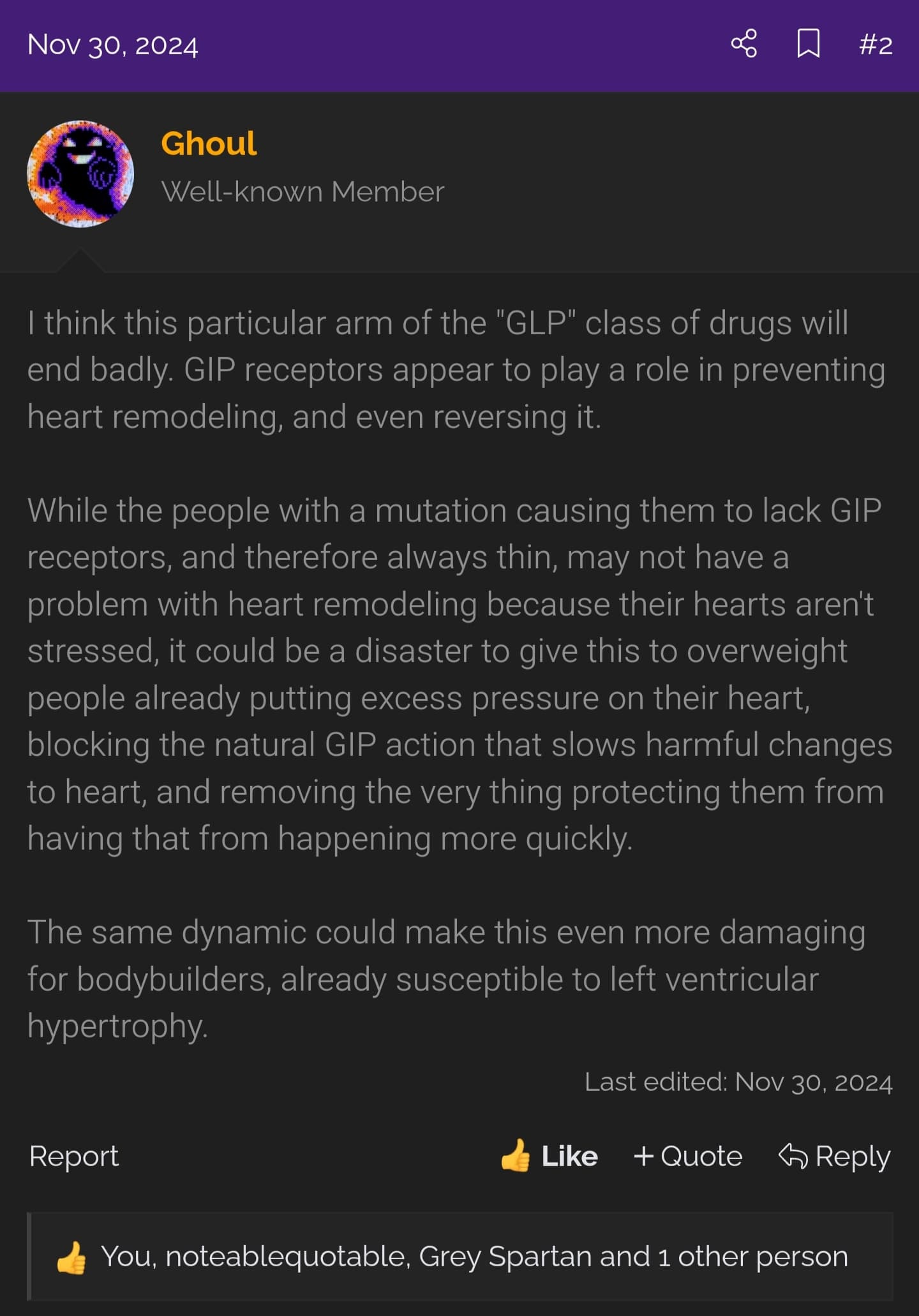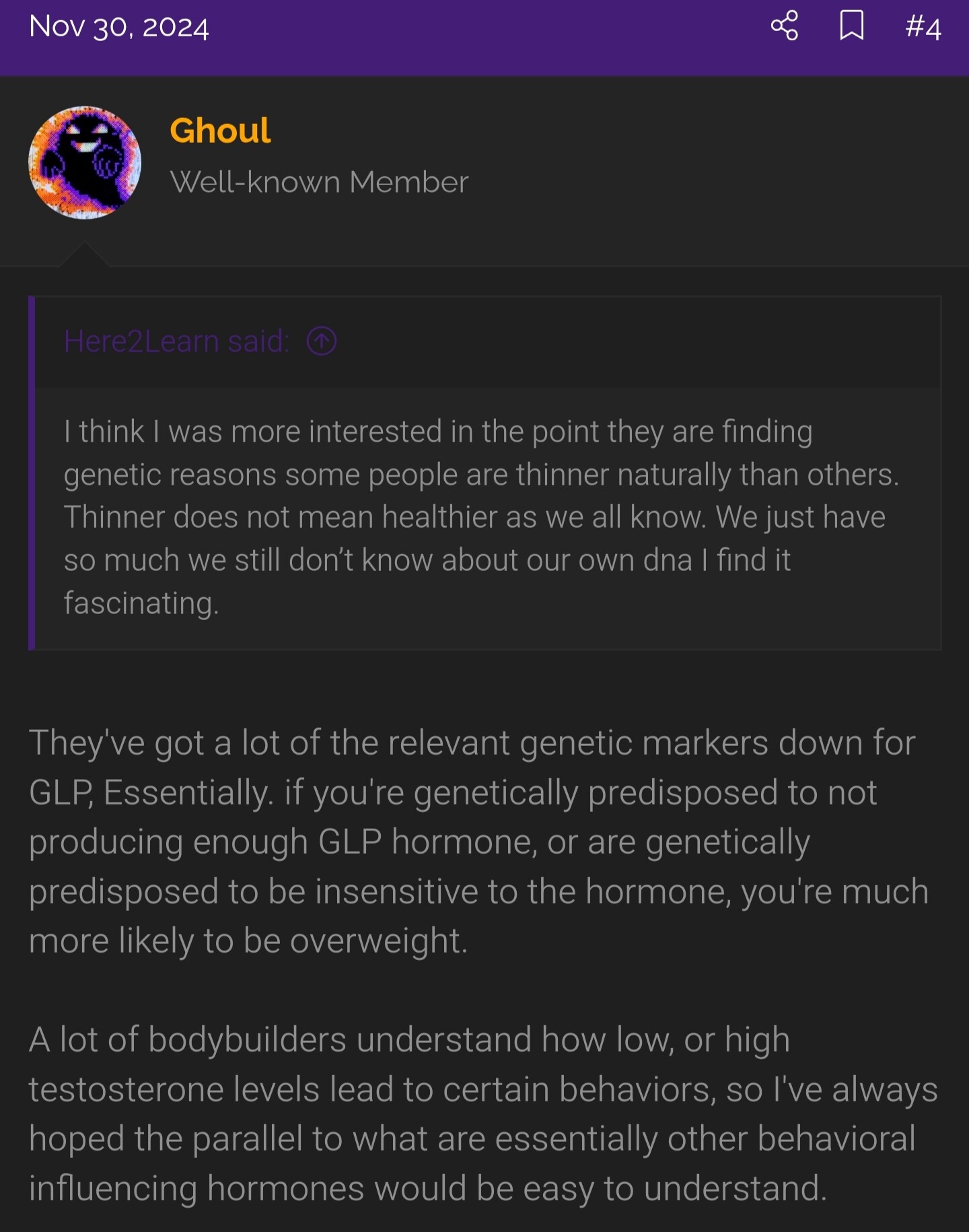It’s one data point. Like anyone else here. I also stopped Rybelsus last month for similar reasons.
From what I read, he did only 3 weeks? Maybe it would have been more informative if he followed the protocol : 4 weeks at the initial dose, followed by 4 weeks at weight loss dose (whatever that’s defined as) . Elevated heart trate could be transient.
But anyway, not everyone has to be on every drug to extend longevity, and he doesn’t seem to be overweight.
Of course, completely understandable. My unease is from the fact that I don’t know what these small changes in RHR and HRV mean - is this temporary? Apparently BJ didn’t take it for long. I’m thinking about the effect od SGLT2i on egfr kidney. There is the initial dip in the egfr number, but longer term there is a recovery - however, the recovery can take up to a year! And when netted out, SGLT2i generally are beneficial to the kidney (at least if the drug is used before the egfr number gets below 30 or so). What if the Rybelsus agent follows a similar path?
Ultimately of course, the bigger question is how meaningful is the RHR and HRV change if netted out to other benefits. I don’t know. Perhaps, it’s worth the slightly worse numbers in exchange for neurological protection? I don’t know. Longitudinal studies would be nice, but I guess there hasn’t been enough time.
Anyhow, a decision about starting or stopping a drug is individual. I never jumped on this particular class of drugs, because I don’t have enough information about concrete benefits and the reading that I have done (and also the papers cited on this board), have not made a compelling enough case for me. Unlike SGLT2i - I have read up on these and ultimately decided that empagliflozin is worth the gamble. YMMV.
Another once a month glp agonist in the works https://www.nytimes.com/2024/11/26/health/weight-loss-drug-maritide-amgen.html
The pharmaceutical manufacturer Amgen announced on Tuesday that an experimental obesity drug helped patients lose up to 20 percent of their weight in a year. The drug, MariTide, is given by injection once a month, compared with once a week for other obesity drugs like Wegovy and Zepbound that are already on the market.
Dr. Jay Bradner, the company’s chief scientific officer, noted a surprising effect of the drug: When the trial ended, many participants maintained their weight loss for as long as 150 days. That means that less frequent injections could be possible or even that patients may not need to stay on the drug permanently. The company said it was studying quarterly injections.
And this drug actually inhibits GIP, instead of activating it. Fascinating.
Dr. Bradner said the company decided to block GIP because it had genetic data from Iceland indicating that people who had a variant that stops GIP from working were naturally thinner
I took another look at the article and it’s actually quite interesting. The authors found that, at least in pigs, the autonomic nervous system is not involved at all in the change in heart rate. This is in contrast to mice and rats where the autonomic nervous system IS involved. So it could be a rather benign increase via direct action on GLP-1 receptors on the heart.
how would it complicate it?
Tried semaglutide for nearly a year at a very low dose 0.25mg. Very effective at controlling food noise. Before I took any GLP1 I had already quit drinking all alcohol, smoking and hadn’t had fast food in over 10 years. I still felt sharper and more in control when on it, having greater portion control.
It’s like my definition of a cheat meal became the average persons healthy choice.
It’s like the ultimate mental health/optimization drug. The mechanistic fat loss from GIP in tirz is a side benefit, the overall effect on your mind is like willpower in a drug just making you make the right choices.
“Ozempic butt/face” is due to improper protocols being given to people by incompetent doctors and clinics. You need to change the overall macronutrient ratio of your diet heavily in favor of protein to maintain muscle mass as you will be lowering your calories by default. You also need to be doing resistance training to maintain and build muscle.
Honestly a miracle drug. I’ve just moved to tirz, hard to say the difference so far but I’m planning on going up in dose as I’m looking to get quite lean and I’m very, very interested in the powerful systemic anti-inflammatory effects it can have that might help me with sleep apnea and asthma.
The studies look incredibly promising on GLP1s, and I strongly believe we will find that either a GLP1 already in existence or in the pipeline will be a true longevity health intervention to rival rapamycin.
I don’t think it has hit people how significant these breakthroughs are. We have literally cured obesity, it just hasn’t reverberated through society yet. In 20 years we may come to a point where there are no obese people, and that obesity is truly a choice in the sense that you need to go out of your way to be obese.
The area under curve will be larger, due to CYP3A4 inhibition be berberine. If you already take rapamycin with grapefruit juice, then there should be now effect from Berberine- GFJ is much better at inhibiting CYP3A4
We need some better myostatin inhibitors in combination with GLP1 because otherwise the morbidly obese will eventually stall after one year.
I consider GLP1-RA’s to be one of the 3 essential legs of my base longevity protocol;
- Tirz or Reta - I prefer Reta
- BPC 157 + TB500 (frag 1- 4) for overall healing and other benefits
- Ipamorelin + CJC1295 noDAC for hGH production
That would be a good one!
In October I started a little experiment. I stopped exercising.
I started Follistatin 344 - a myostatin inhibitor, but not a perfect one
Over the winter with less physical activity, my muscle mass did not go down.
I “think” my biceps have maintained size (maybe even a bit bigger) and they have maintained tone
My base test is pushups.
After 4 months of doing little in the area of physical fitness I can still do 25 push ups, same as what I was doing in early Oct.
The biggest problem with FS344 is the cost, it’s one of the most expensive peps on the market. I am just finishing my 6 month experiment with that one and I’m thinking it worked.
Started our new experiment with anther exercise mimetic a month ago with SLU-PP-332, while not a myostatin inhibitor it has other properties that make it very interesting. So far I have noticed an increase in endurance. I have short periods of intense physical work and have had no issues with regard to strength or endurance. My 2 gym rats are very impressed with this one with respect to increased weights and extended cardio function.
I think we are getting close to have reasonable protocols for sarcopenia.
TB500 is an interesting one. What have you experienced with this?
As for growth hormone and secretagogue peptides I’m not sure on these. Isn’t growth hormone anti longevity in the long run?
Muscle loss from improper GLP1 usage is causing pharma companies to look for new drugs to help preserve and build muscle. Bodybuilders must be cheering lol.
Hi @Steve_Combi
I always find your posts very informative! I would rate the first 2 items the same as you. I don’t have experience with the growth hormone secretagogue peptides myself. I also tend to go with the Glow version on item (2) → BPC 157 + TB500 + GHK-cu (10+10+50).
On item (2) given continuous use do you worry about any cancer growth risks; specifically some worry about cancer with BPC under continuous use?
BCP+TB500+GHK-cu is amazing for recovery on a day to day basis imho but I currently cycle its use (2 weeks on - 4 weeks off) due to potential cancer worry.
That is a good question and the way you have phrased it is interesting, “growth risk” being the key aspect of the question.
My take away from the available studies is that it may or may not enable growth of existing cancers. I don’t see any papers suggesting it would initiate new cancer. It, BPC, and other peptides that promote angiogenesis would all have the same concern, as that is where the “influencer” speculation lies.
There is no proof that BPC would support cancer growth that I know of. In fact, just the opposite is what appears in a few papers.
I have posted my thoughts on non-GLP1 peptides in this thread Peptides / Bioregulators - #763 by Steve_Combi
@Steve_Combi how is your soreness level on this protocol? Have you noticed any difference in terms of recovery when on vs off protocol? As I’ve progressed in my weight lifting, I’ve gotten more and more soreness (DOMS), even with proper recovery.
Somewhat unrelated: Have you looked into GHK-cu as a possible intervention to retain muscle? It’s considered mainly a cosmetic peptide, but I think its benefits may go beyond being the maiin ingredient of GLOW. I’ve come across this interesting paper on its use for skeletton muscle dysfunction in rats:
https://onlinelibrary.wiley.com/doi/full/10.1002/jcsm.13213
Mechanistically, GHK-Cu directly binds and activates SIRT1(the binding energy was −6.1 kcal/mol). Through activating SIRT1 deacetylation, GHK-Cu inhibits FoxO3a transcriptional activity to reduce protein degradation, deacetylates Nrf2 and contribute to its action of reducing oxidative stress by generation of anti-oxidant enzymes, increases PGC-1α expression to promote mitochondrial function. Finally, GHK-Cu could protect mice against CS-induced skeletal muscle dysfunction via SIRT1.
Conclusions
Plasma glycyl-l-histidyl-l-lysine level in patients with chronic obstructive pulmonary disease was significantly decreased and was significantly associated with skeletal muscle mass. Exogenous administration of glycyl-l-histidyl-l-lysine-Cu2+ could protect against cigarette smoking-induced skeletal muscle dysfunction via sirtuin 1.
Big difference. I think that because we’ve been doing the BPC+TB500 stack almost every day for 20 months, with several 1 week breaks, we are primed to heal.
I’ve posted on this before, I recover from hard work overnight.
I have several gym rats, including our 41 y/o son who also experiences rapid recovery and healing and misses that benefit when we have an off week. He has gained about 8lbs of muscle since this photo and lost 5lbs of fat. He’s around 185lb. All while on a weekly dose of 1.5mg Reta
I have not tried GHK-cu as an injectable but I’ve been making a skin care product with that peptide for over 3 years and have a lot of local repeat customers. It works!!
I do take other peptides that support mitochondria.
This thread has a lot more info on a wider range of peptides.

We established a theoretical model for how the modulation of GLP-1 agonists via increased serotonergic activity at the 5-HT2C receptor may have an associated negative effect on sexual desire. We then applied a biopsychosocial framework to highlight why this effect may be overlooked by both GLP-1-treated patients and clinicians. Although the serotonergic pathway may create a physiological decrease in sexual desire for patients taking GLP-1 agonists, the biopsychosocial factors discussed propose a potential mechanism by which these adverse effects are masked. In other words, we postulate that the negative influence of GLP-1 agonism on sexual desire, mediated by serotonergic pathways, as well as undesirable facial effects (“Ozempic Face”) and increased SHBG, etc., are offset by the positive influences on sexual desire such as increased total testosterone, improved vascular reactivity, and a more positive mood.
FWIW…

